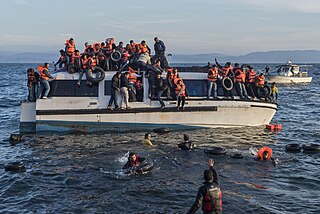The Office of the United Nations High Commissioner for Refugees (UNHCR) is a United Nations agency mandated to aid and protect refugees, forcibly displaced communities, and stateless people, and to assist in their voluntary repatriation, local integration or resettlement to a third country. It is headquartered in Geneva, Switzerland, and has 20,305 staff working in 136 countries as of December 2023.

The International Organization for Migration (IOM) is a United Nations related organization working in the field of migration. The organization implements operational assistance programmes for migrants, including internally displaced persons, refugees, and migrant workers.

An internally displaced person (IDP) is someone who is forced to leave their home but who remains within their country's borders. They are often referred to as refugees, although they do not fall within the legal definitions of a refugee.

Forced displacement is an involuntary or coerced movement of a person or people away from their home or home region. The UNHCR defines 'forced displacement' as follows: displaced "as a result of persecution, conflict, generalized violence or human rights violations".

The Southeast European Cooperative Initiative (SECI) is a multilateral regional initiative that has been initiated by the European Union, the United States of America and the countries of Southeast Europe within the framework of the Organization for Security and Cooperation in Europe (OSCE) as a support to the implementation of the Dayton Accords in December 1996 at the inaugural session at Geneva on the basis of Final Points of Common EU-USA Understanding.

The International Catholic Migration Commission (ICMC) is an international organization that serves and protects uprooted people, including migrants, refugees, and internally displaced people, regardless of faith, race, ethnicity or nationality. With staff and programs in over 40 countries, ICMC advocates for sustainable solutions and rights-based policies directly and through a worldwide network of 132 member organizations.
In 2009, efforts to crack down on human trafficking in Russia focused not only on the men, women, and children who were illegally shipped out of Russia to undergo forced labor and sexual exploitation in other countries, but also those who were illegally brought into Russia from abroad. The Government of the Russian Federation has made significant progress in this area since 1999, but a report commissioned by the United States Department of State in 2010 concluded that much more needed to be done before Russia could be taken off its Tier 3 watchlist.
The U.S. Committee for Refugees and Immigrants (USCRI) is a 501(c)(3) nonprofit organization with locations in the United States, Mexico, El Salvador, Honduras, and Kenya, and a national network of nearly 200 partner agencies that provide support for those experiencing forced and voluntary displacement.

In 2008, Ukraine was a source, transit, and destination country for men, women, and children trafficked transnationally for the purposes of commercial sexual exploitation and forced labor.
In 2019 Zimbabwe was a source, transit, and destination country for men, women, and children trafficked for the purposes of forced labor and sexual exploitation. Large scale migration of Zimbabweans to surrounding countries - as they fled a progressively more desperate situation at home - increased, and NGOs, international organizations, and governments in neighboring countries reported an upsurge in these Zimbabweans facing conditions of exploitation, including human trafficking. Rural Zimbabwean men, women, and children were trafficked internally to farms for agricultural labor and domestic servitude and to cities for domestic labor and commercial sexual exploitation. Women and children were trafficked for domestic labor and sexual exploitation, including in brothels, along both sides of the borders with Botswana, Mozambique, South Africa, and Zambia. Young men and boys were trafficked to South Africa for farm work, often laboring for months in South Africa without pay before "employers" have them arrested and deported as illegal immigrants. Young women and girls were lured to South Africa, the People's Republic of China, Egypt, the United Kingdom, the United States, and Canada with false employment offers that result in involuntary domestic servitude or commercial sexual exploitation. Men, women, and children from the Democratic Republic of the Congo, Malawi, Mozambique, and Zambia were trafficked through Zimbabwe en route to South Africa. Small numbers of South African girls were trafficked to Zimbabwe for domestic servitude. The government’s efforts to address trafficking at home have increased with the introduction of the National Action Plan (NAP) as well as the 2014 Trafficking in Persons Act. In addition, the trafficking situation in the country is worsening as more of the population is made vulnerable by declining socio-economic conditions.
The United Nations Global Initiative to Fight Human Trafficking (UN.GIFT) is a multi-stakeholder initiative providing global access to expertise, knowledge and innovative partnerships to combat human trafficking.
Angola ratified the 2000 UN TIP Protocol in September 2014.
Human trafficking in Europe is a regional phenomenon of the wider practice of trade in humans for the purposes of various forms of coercive exploitation. Human trafficking has existed for centuries all over the world, and follows from the earlier practice of slavery, which differed from human trafficking in that it was legally recognized and accepted. It has become an increasing concern for countries in Europe since the Revolutions of 1989. The transition to a market economy in some countries has led to both opportunity and a loss of security for citizens of these countries. Economic hardship and promises of prosperity have left many people vulnerable to trafficking within their countries and to destinations in other parts of Europe and the world. Unique to the Balkansare some of the situations that support trafficking, such as organized crime, and the recruitment strategies that perpetuate it. While some generalizations can be made, the countries within this region face different challenges and are at varying stages of compliance with the rules that govern trafficking in persons.
The number of people who are currently displaced inside Iraq is estimated to be 3 million, almost one out of every ten Iraqis. This figure is cumulative and represents both those displaced before and after the 2003 US-led invasion. Displacement in Iraq is "chronic and complex:" since the 1960s Iraq has produced the largest population of Internally Displaced Persons (IDPs) and refugees of any state in the Middle East.
Sudanese refugees are people originating from the country of Sudan, seeking refuge outside the borders of their native country. In recent history, Sudan has been the stage for prolonged conflicts and civil wars, as well as environmental changes, namely desertification. These forces have resulted not only in violence and famine but also the forced migration of large numbers of the Sudanese population, both inside and outside the country's borders. Given the expansive geographic territory of Sudan, and the regional and ethnic tensions and conflicts, much of the forced migration in Sudan has been internal. Yet, these populations are not immune to similar issues that typically accompany refugeedom, including economic hardship and providing themselves and their families with sustenance and basic needs. With the creation of a South Sudanese state, questions surrounding southern Sudanese IDPs may become questions of South Sudanese refugees.
The Office of Refugee Resettlement (ORR) is a program of the Administration for Children and Families, an office within the United States Department of Health and Human Services, created with the passing of the United States Refugee Act of 1980. The Office of Refugee Resettlement offers support for refugees seeking safe haven within the United States, including victims of human trafficking, those seeking asylum from persecution, survivors of torture and war, and unaccompanied alien children. The mission and purpose of the Office of Refugee Resettlement is to assist in the relocation process and provide needed services to individuals granted asylum within the United States.

Voluntary return or voluntary repatriation is usually the return of an illegal immigrant or over-stayer, a rejected asylum seeker, a refugee or displaced person, or an unaccompanied minor; sometimes it is the emigration of a second-generation immigrant who makes an autonomous decision to return to their ethnic homeland when they are unable or unwilling to remain in the host country.

George Gigauri or Giorgi Gigauri is a UN official and senior humanitarian, serving as the Chief of Mission of the International Organization for Migration (IOM), the UN Migration Agency, in Iraq.
In Azerbaijan, migration policy is handled by the State Migration Service, and appropriate departments of Ministry of Labor and Social Protection of Population, Ministry of Healthcare, Ministry of Foreign Affairs, Ministry of İnternal Affairs, State Border Service, State Committee of Republic of Azerbaijan for Refugees and IDPs and State Security Service. Migration Code, Law on Citizenship, Law on Immigration are the foundations of migration policy in Azerbaijan. An independent migration office - State Migration Service was established on March 19, 2007 to regulate fast-paced migrant and prepare comprehensive and efficient migration policies.







